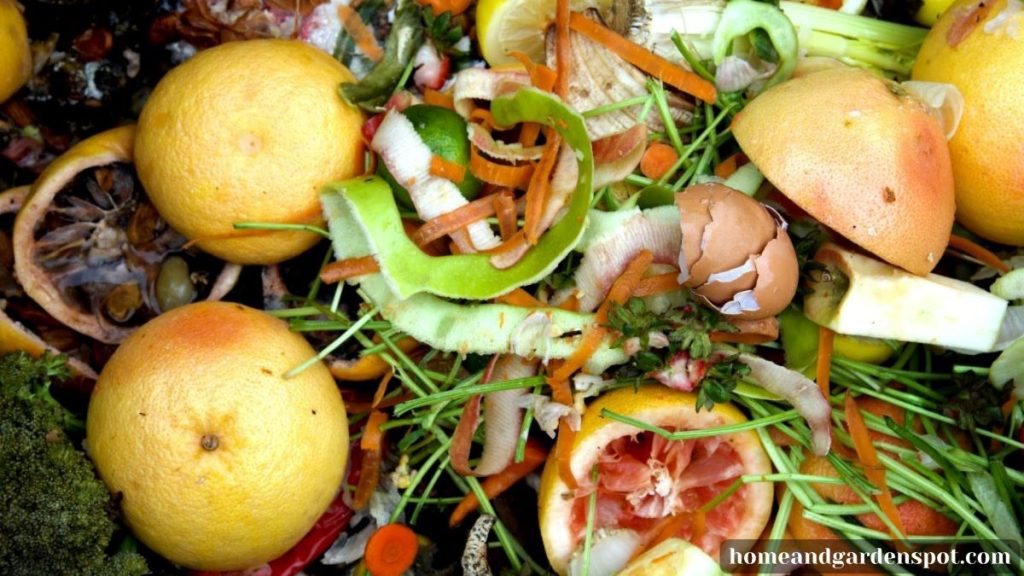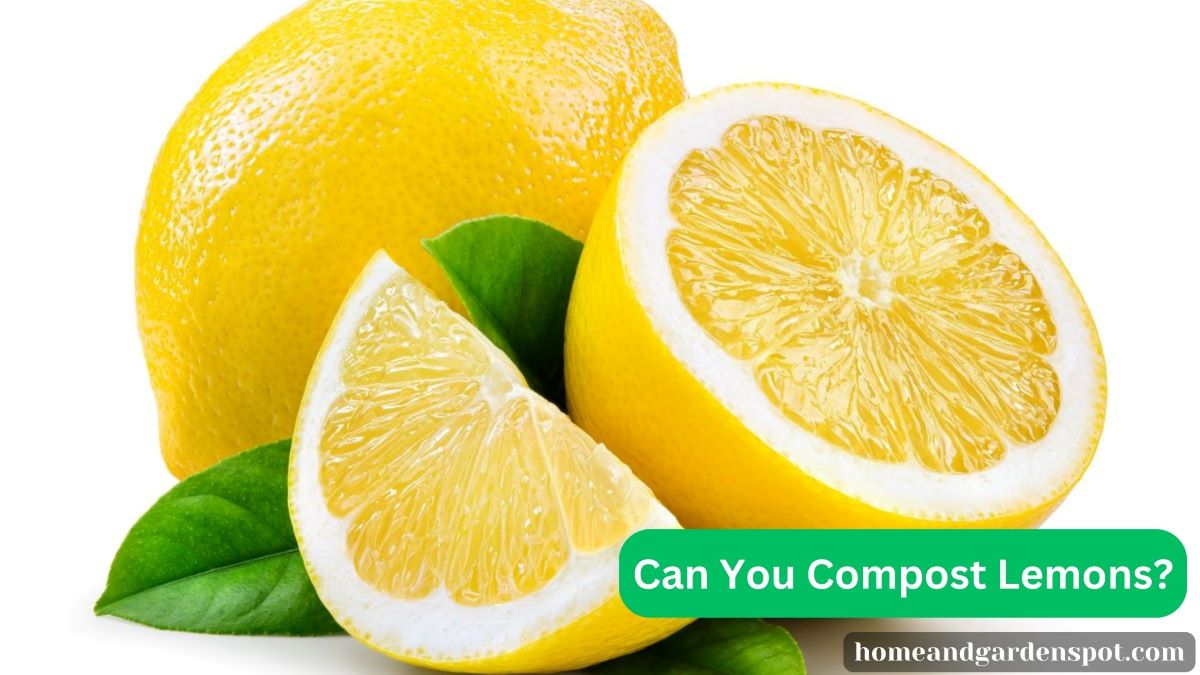The age-old adage advises us to make lemonade when life throws you lemons. However, there’s another remarkable way to put those lemons to good use – by composting them.
As someone who has embraced the joys of gardening and sustainable living, I’ve often found myself with many kitchen scraps. With their bright and zesty flavor, Lemons frequently make their way into my kitchen.
While they are a delightful addition to culinary creations and refreshing beverages, I discovered they can also play a crucial role in enriching my garden’s soil. Now, can you compost lemons?
You can compost lemons because they are organic materials that naturally decompose, adding valuable nutrients to your compost pile. Their acidity, when properly balanced with other compost materials, can enhance the overall composition of the compost.
Composting is a time-tested method for converting organic waste into nutrient-rich humus, which is invaluable for enhancing soil quality. Though acidic in nature, Lemons can be successfully composted when done correctly.
Furthermore, I will give the procedures for composting lemon, the factors to consider, and also guide you through my experience as a gardener.
Is Lemon Good For Soil?
Lemons are good and beneficial for the soil. For instance, they can help adjust the soil’s acidity level. Lemon peels are nutrient-rich and can be added to the soil to provide vitamins and minerals to plants. They can also be used to repel pests such as gnats and mosquitoes.
However, it’s important to note that adding too much lemon to the soil can be harmful to plants. Lemon juice is acidic and can lower the pH of the soil, which can make it difficult for some plants to grow. Therefore, it’s advisable to use lemon in moderation and only when necessary.
How to Compost Lemon For Gardening
Before composting your lemon for gardening, there are certain things you need to keep in mind. You need to know lemons as the following:
Lemons as greens or browns
Lemons are categorized as green compost material due to their high nitrogen content.
High acidity and decomposition
The high acidity in lemons can potentially slow down the decomposition process. It’s essential to be aware of this characteristic when incorporating lemons into your compost.
Proper preparation of lemons for composting
Achieving a balanced pH level in your compost is vital. To counteract the acidity of lemons, blend them with less acidic materials, such as eggshells, which are alkaline.
Additionally, chopping or shredding lemons into smaller pieces can expedite decomposition.
Balancing lemons with other materials
To prevent an overabundance of citrus fruits in your compost, ensure they are mixed with a variety of other compostable materials, including grass clippings, leaves, and vegetable scraps.

Step to Step Guide On How to Compost Lemon
Here’s a step-by-step guide on how to compost lemons effectively for gardening:
1. Break Up the Peels
Lemon peels are often tough and thick and may have a wax coating to prevent drying during storage. Breaking these peels into smaller pieces before adding them to your compost pile is essential to facilitate decomposition.
Aim for pieces roughly the size of your thumbnail. This increases the surface area for decomposers to work on, and any wax coating will degrade along with the peel.
2. Compost Lemons in Moderate Quantities
The quantity of lemons and citrus you add to your compost matters. If you’re including peels and pulp from occasional lemon use in your cooking or the peels from a couple of grapefruits, your compost system should handle it without issues.
However, adding a large quantity of lemon peels daily, such as those from a lemonade stand, can overwhelm your compost pile. Maintain a balance to ensure effective decomposition.
3. Achieve Balance in Composting
Composting is about balancing carbon-rich materials (like leaves, straw, and paper) and nitrogen-rich materials (such as food scraps and grass clippings). The ideal ratio is 30 parts carbon to 1 part nitrogen.
Lemon peels are considered a nitrogen source, so ensure you have enough carbon-rich materials in your compost pile to maintain this balance.
4. Turn the Pile
To accelerate decomposition, regularly turn your compost pile every few weeks. Turning introduces oxygen into the mix, which is essential for the activity of decomposers.
This helps break down materials, including lemon peels, more efficiently. Proper aeration can prevent the pile from becoming too compact and smelly.
5. Be Patient
Composting is not an instant process; it requires patience. Depending on various factors, such as the size of your compost pile, the environmental conditions, and the materials used, it can take several weeks to months for your compost to be fully matured and ready for use in your garden.
Tips and Best Practices For Composting Lemon
1. Mixing Lemons with Other Compostable Materials
To ensure a successful composting process when using lemons, it’s crucial to mix them with a variety of other compostable materials like cheese!
- Balance of Greens and Browns:
Lemons, being nitrogen-rich, fall into the “green” category of compost materials. Mixing them with “brown” materials like leaves, straw, or cardboard helps achieve the ideal balance of carbon (browns) and nitrogen (greens) in your compost pile. This balance fuels microbial activity and ensures effective decomposition.
How to Mix Lemons with Other Materials:
- Alternate greens (lemons) layers and browns in your compost pile. This layering promotes a balanced mixture and minimizes clumping or matting.
- Regularly turning your compost pile helps mix the materials, ensuring that the lemons are evenly distributed among other organic matter.
2. Avoid Overusing
While lemons can be valuable additions to your compost, it’s essential to avoid overloading your pile with citrus fruits due to a few potential challenges:
- Acidity
Citrus fruits, including lemons, are highly acidic. Excessive acidity can slow down decomposition and affect the pH balance of your compost, making it too acidic.
How to Avoid Overuse
- Limit the quantity of citrus fruits you add to your compost pile. A few lemon peels or slices at a time are typically sufficient, especially in smaller compost setups.
- Ensure a good mix of various compost materials, including non-acidic greens and browns, to offset the acidity of citrus fruits.
3. Chop or Shred Lemons for Faster Decomposition
Breaking down lemons into smaller pieces through chopping or shredding is a valuable practice:
- Faster Decomposition
Smaller pieces of lemons decompose more quickly than whole ones. This increases the overall efficiency of your compost pile.
How to Chop or Shred Lemons
- Use a kitchen knife, food processor, or shredder to reduce lemons into smaller bits.
- Aim for uniform size to ensure consistent decomposition throughout the compost pile.
4. Regular Turning and Aeration of the Compost Pile
Turning and aerating your compost pile is vital for optimal decomposition and to prevent issues like foul odors or compacted, anaerobic conditions:
- Oxygen Supply
Turning the pile introduces oxygen, which is essential for aerobic decomposition by beneficial microorganisms.
- Even Decomposition
Regular turning ensures that all parts of the pile receive adequate airflow and moisture, promoting uniform decomposition.
- Odor Control
Proper aeration helps prevent the development of unpleasant odors often associated with anaerobic decomposition.
How to Turn and Aerate
- Use a garden fork or shovel to turn the pile every few weeks. This will mix the materials and introduce fresh oxygen.
- Consider installing aeration tubes or pipes within the pile to facilitate air circulation.
- Ensure that the compost pile remains moist but not waterlogged. Adequate moisture is crucial for microbial activity.
5. Maintain Proper Moisture Levels
- Proper moisture levels are essential for the health of your compost pile:
- Moisture is necessary for the microorganisms responsible for decomposition to thrive.
- It helps maintain the appropriate texture in the compost pile, ensuring airflow and preventing compaction.
- Moisture helps regulate the pile’s temperature, preventing it from becoming too hot or too cold.
How to Maintain Moisture Levels
- Monitor moisture levels by squeezing a handful of compost material. It should feel like a wrung-out sponge.
- Add water when necessary to maintain moisture. If it becomes too wet, add more browns (e.g., dry leaves) to absorb excess moisture.
6. Adjust the Compost Recipe Based on the Lemon Quantity
When you have a significant quantity of lemons to compost, it’s essential to adapt your compost recipe:
- Balanced Decomposition
Large quantities of lemons may overwhelm the compost pile with greens, risking imbalances and slow decomposition.
- Proper Nutrition
Adding more browns (carbon-rich materials) helps balance the nitrogen-rich lemons, providing the necessary nutrients for microorganisms.
How to Adjust the Recipe
- As the quantity of lemons increases, add more carbon-rich materials like dried leaves, straw, or shredded cardboard.
- Ensure that you maintain a proper balance by layering greens and browns, even more so when dealing with a surplus of lemons.
Can You Put Lemon And Lime In Compost?
Yes, you can safely add lemons and limes to your compost pile. There is a common myth that citrus fruits cannot be safely composted due to concerns about their acidic properties, possible chemical residue on lemons, and the fact that the rinds are tougher to break down.
However, these concerns are misplaced as any excess acid or chemical residues are neutralized during composting, and rinds can be cut into small pieces to speed up the decomposition process.
Citrus fruits like lemons and limes can be added to your compost pile or worm bin. They can help decompose cellulose and lignin in the cell walls of fruits and vegetables and bind together “woody” fibers.
Can You Put Lemons And Oranges In Compost Pile?
Yes, you can safely add lemons and oranges to your compost pile. Citrus fruits like lemons, limes, and oranges can be added to your compost pile or worm bin. They can help decompose cellulose and lignin in the cell walls of fruits and vegetables and bind together “woody” fibers.
Conclusion
Lemons, unique characteristics, and high acidity are indeed suitable for composting when managed thoughtfully. They contribute to the nutrient content of the compost, and their acidity can be balanced by incorporating alkaline materials like eggshells. While their decomposition may be slower due to acidity, chopping or shredding lemons can speed up the process. When properly integrated into your compost pile, lemons become valuable contributors to the overall organic matter breakdown.

Leave a Reply